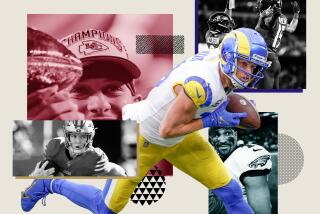Pro Football / Bob Oates : Tampa Probably Will Be Awarded Super Bowl XXV
- Share via
As the main business item of the National Football League’s spring meeting in San Diego today, the owners of the 28 teams will vote the 25th Super Bowl game into one of five sites: Miami, Tampa, San Diego, Anaheim or the Los Angeles Coliseum.
Those are the finalists as predetermined for the January, 1991, game. And reportedly, the NFL has already picked Tampa.
“They had a very successful Super Bowl there (in 1984),” Mike McCormack, president of the Seattle Seahawks, said the other day, expressing a general NFL view. “One other thing: The L.A. offer isn’t as good.”
If Tampa gets the game, the winners will be NFL politics and income. Tradition will be the loser. For the 25th isn’t just another Super Bowl. And the ideal place for it is the L.A. Coliseum.
Site of two successful Olympics, the Coliseum was handpicked by Commissioner Pete Rozelle for the first Super Bowl in 1967.
“This game doesn’t belong anywhere else,” Rozelle said at the time, noting that a long series of 90,000 Coliseum crowds in the ‘50s moved the NFL from a territorial Eastern league into the big leagues.
Since then, the commission that runs the stadium has partnered with the Raiders’ Al Davis in an antitrust action against the NFL that could shower up to $20 million on the Coliseum.
But the makeup of this particular commission changes every few years. It was a different bunch that sued the NFL. The new Coliseum Commission has opposed Davis as strenuously as has any NFL owner. His people say he will soon be leaving town.
So an NFL political decision against Los Angeles is no longer necessary. The new Coliseum Commission, which will probably need an expansion team shortly, wants to be friends with the league.
All this gives the NFL a splendid opportunity to serve nothing but tradition in Super Bowl XXV--as it did in Super Bowl I.
Since the NFL Players Assn. authorized a strike vote here at its convention in March, its leaders have met with management only once.
That was on April 21, when Gene Upshaw, the players’ executive director, exchanged opening proposals with Jack Donlan, executive director of the NFL’s management council.
“They haven’t set a date for their next meeting,” a management spokesman, Vince Casey, said.
The players still want free agency. The league still wants obligatory random drug testing.
Their present bargaining agreement will end Aug. 31, a few days before the first regular-season games.
At the league meeting this week, Donlan will report on the lack of progress.
The courts made another quarterback available to pro football clubs this week. He is Tony Robinson of Tennessee, who had been serving time on a drug conviction.
Will Robinson be in an NFL lineup this fall?
“I’m sure he’ll at least get a tryout by one or two teams,” NFL spokesman Joe Browne said.
In Seattle, the Seahawks’ McCormack said: “(Robinson) is a different kind of quarterback, but he has a good passing arm. I think someone will sign him.”
The Seahawks, however, don’t expect to, McCormack said. And neither do the Raiders, who don’t even plan to give Robinson a tryout.
“We have Rusty Hilger and Steve Beuerlein,” said Ron Wolf of Raider personnel operations. “That’s it for young quarterbacks. We’re full.”
If he makes it, Robinson, whose college class has graduated, will come into the NFL as a free agent.
He will, that is, if he gets the commissioner’s authorization to play.
“(Rozelle) will review Robinson’s recent past involving drug-related problems before a contract is approved,” Browne said.
The NFL is planning its Brian Bosworth draft lottery for early next month.
Another player or two may then be eligible to join the Oklahoma linebacker in the same supplemental draft, a league official said, adding:
“All they have to do is finish school before their college eligibility is up.”
Bosworth passed on last month’s regular NFL draft to avoid playing with a losing team.
Next month he could go to any club that draws his name out of a basket--any except the Rams, who lost their 1987 and ’88 No. 1 picks to Houston in the Jim Everett trade. The supplemental draft is considered part of the 1988 draft.
The odds still favor those with the poorest records. In the NFL’s weighted lottery system, the club with last year’s worst record gets 28 chances at a player like Bosworth, the next-worst gets 27, and so on up the standings.
Chances will be in the form of team symbols extracted at random from the basket--406 symbols for the 27 eligible teams.
The odds on Bosworth are thus 405 to 1 against the champion New York Giants.
Knee-Brace Update: Recent debates between coaches and academic people have clouded the main issue: Are braces helpful, of no consequence, or perhaps even harmful?
The situation is cloudy because there has always been one missing research ingredient--a look inside anyone’s knee at the moment of a lateral blow.
The only likely answer to that kind of problem is a bionic knee. And one such has been constructed by a research team from the University of Utah, Michigan Technological University and other institutions.
After extensive testing, the project director, Lonnie Paulos, a Salt Lake City doctor, comes down on the side of bracing.
At a meeting of the American Academy of Orthopedic Surgeons, Paulos reported: “I believe . . . it is possible to protect the knee, at least biomechanically, with a properly designed lateral knee guard. . . . Can (it) be harmful? I believe the answer is probably not.”
More to Read
Go beyond the scoreboard
Get the latest on L.A.'s teams in the daily Sports Report newsletter.
You may occasionally receive promotional content from the Los Angeles Times.










